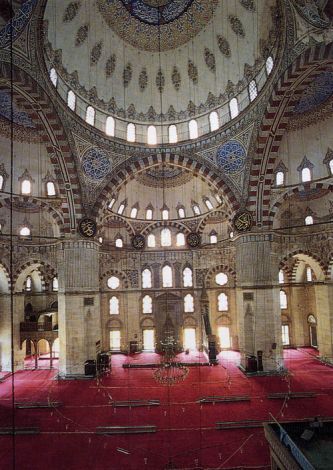MEHMET AKIF ERSOY (1873-1936)
Mehmet Akif Ersoy, whose real name was Mehmet Ragif was born in Istanbul, in 1873. He was born to a conservative family at a time when all institutions of the state were in decline, and major crises and regime changes were underway. As he was about to complete his education at the Fatih Merkez Rüştiyesi, his father’s death and a fire that destroyed his home, forced Ersoy to interrupt his education and to start working to support his family. He wanted to start a professional career as soon as possible, and he entered the Mülkiye Baytar Mektebi (Veterinary School), and graduated with honors in 1893. In the same year, Mehmet Akif Ersoy joined the civil service and conducted research on contagious diseases in various locations in Anatolia. During these assignments, in line with his religious inclination, he gave sermons in mosques, and tried to educate the people and to raise their awareness. Along with fellow men-of-letters Recaizade Mahmut Ekrem, Abdülhak Hamit Tarhan and Cenap Şahabettin, which he had met in 1913, he worked for the publication branch of the Müdafaa-i Milliye Heyeti. He soon resigned from his government position and other occupations, and wrote poems and articles for the publication Sırat-ı Müstakim.
Mehmet Akif Ersoy is best known for his work entitled Safahat. This volume is a collection of 44 poems of various lengths by Mehmet Akif Ersoy. The earliest work that appears in this book is dated 1904, but this is unattested, and it is highly likely that the poet, who was 32 on that particular date, composed poems prior to that date. He was the foremost representative of Islamism, which was one of the movements that followed the declaration of constitutional monarchy. Because of his dedication to his principles, his honesty, and because he practiced what he preached, he was distinguished among the intellectuals and poets of his time. Just like his contemporaries, he had abundant knowledge concerning traditional eastern literature. In addition, during the years he was studying at Veterinary school, he enjoyed reading the works of authors such as Victor Hugo, Alphonse de Lamartine, Emile Zola, and Jean-Jacques Rousseau.
During the collapse of the Ottoman Empire, Mehmet Akif Ersoy was a fervent patriot. He made important contributions to the struggle for the declaration of the Turkish Republic, and advocated patriotism though speeches that he delivered in many mosques in Anatolia. On November 19, 1920, during a famous speech he gave in Kastamonu’s Nasrullah Mosque, he condemned the Treaty of Sevres, and invited the people to use their faith and guns to fight against Western colonialists. When the publication Sebilürreşat, which was then operating out of Ankara, published this speech, it spread all over the country and was even made into a pamphlet distributed to Turkish soldiers. However, Mehmet Akif Ersoy earned himself his significant place in the history of the Republic of Turkey as the composer of the lyrics of the Turkish National Anthem. During the session of March 12, 1921, the Turkish Grand National Assembly officially designated his ten-quatrain poem as the lyrics of the national anthem. Mehmet Akif Ersoy is an important national figure in the history of modern Turkey and has left an immortal trace in its history. During the republican period, Mehmet Akif Ersoy taught history and literature at various universities. He caught malaria during a visit to Lebanon and died on December 27, 1936 in Istanbul.
Works:
Poetry: Safahat (Articles, 1911), Süleymaniye Kürsüsünde (At the Chair of Süleymaniye, 1912), Hakkın Sesleri (Voices of God, 1913), Fatih Kürsüsünde (At the Chair of Fatih, 1914), Hatıralar (Memoirs, 1917), Asım (Asım, 1924), Gölgeler (Shadow, 1933).
Thought-Research: Kastamonu Nasrullah Kürsüsü'nde (At the Kastamonu Nasrullah Chair, 1921), Kur'an'dan Ayet ve Hadisler (Sentences and Hadis in the Koran, 1944).
* Biographical information concerning Mehmet Akif Ersoy has been gathered from Tanzimat’tan Bugüne Edebiyatçılar Ansiklopedisi.
Reference: Yesim Gokce(Bilkent University)/Turkish Cultural Foundation.
Some selected examples (please click on pictures to enlarge):









